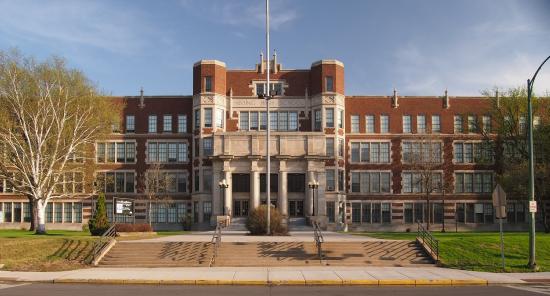6.1: Introduction to Political Identity
- Last updated
- Save as PDF
- Page ID
- 135850

- Dino Bozonelos, Julia Wendt, Charlotte Lee, Jessica Scarffe, Masahiro Omae, Josh Franco, Byran Martin, & Stefan Veldhuis
- Victor Valley College, Berkeley City College, Allan Hancock College, San Diego City College, Cuyamaca College, Houston Community College, and Long Beach City College via ASCCC Open Educational Resources Initiative (OERI)
Learning Objectives
By the end of this section, you will be able to:
- Define political identity and related terms such as political socialization and political mobilization of identity.
- Identify the ways in which individuals undergo political socialization towards the formation of political identity.
- Consider the connections between political identity and political mobilization.
Political Identity and Related Terms
Identity, broadly considered, answers the question, 'Who am I?' as well as 'How do I want to be seen by others? and 'How do I want to be seen in the future?' A person’s identity is developed from a combination of factors, including a person’s experiences, relationships, perception of the world, calculation of risk and threat in the world, as well as their observations and experience of societal mores, morals and values. Many times, identity can take firm hold over characteristics for which people have no actual control, like a person’s race, height, eye color, socio-economic class, and so forth. In all cases, identity forms through a process of socialization, where the individual discovers themselves and where they think they fit within the social order. Identity, and the calculation of one’s identity, can have sweeping implications in society. Since identity, once formed or identified, can section people into groups of 'sameness' and 'differentness,' conflict usually follows. As a consequence, the development and outcomes of identity, in it of itself, shapes the world around us and the conflicts that arise. It can also help us understand history and past conflicts when considered through the lens of an identity focused narrative.
Not surprisingly, the term political identity shares almost all of the same traits as the term identity itself. Political identity also answers the questions of 'Who am I?' and 'How do I want to be seen by others,' but from a political orientation. Political identity is defined as how a person or group of persons think of themselves in relation to the politics and government of a country. It refers to the labels and characteristics an individual chooses to associate with based on a multitude of factors including but not limited to, their perception of political ideologies, platforms and parties, as well as how they see themselves from national, racial, ethnic, linguistic, cultural and gender perspectives.
There are many political identities that political scientists have considered over the last two decades, with some identities being rooted in biology and genetics (race, biological gender, etc.) with a great deal being rooted in symbolic, religious, and patriotic origins. (For instance, It’s the difference between being born a certain race and identifying with that race versus deciding to belong to a religious group on one’s own volition). One of the main reasons political scientists have begun focusing on political identity is because human attachment to these identities has been mobilized for/with political consequences. Political mobilization is defined as organized activities intended to motivate groups of participants to take political action on a particular issue. There have been many examples of political identity resulting in political mobilization.
Consider the 2010 Arab Spring, which was a series of protests against oppressive government regions in the Middle East. Protests occurred in Bahrain, Saudi Arabia, Egypt, Libya, Syria, Tunisia, the United Arab Emirates and Yemen, and sometimes resulted in violence. The protesters tended to be from two main identity groups. One group was each country’s youth, that is, young people who were dissatisfied with authoritative regimes and wanted democratic governments. Another group were from those belonging to Unions, which were under constant threat in these countries. In this circumstance, the identity of the younger population, as well as the identity of those belonging to Unions and wanting the recognition of their identity as well as the ability to be represented politically, both were mobilizing to demand change. Though there is still conflict in all of these countries, the Arab Spring is said to have ended in 2012, and one of the key findings was that countries which did not have oil and/or oil wealth were much more likely to undergo regime transition as a result of these protests than those countries that were oil rich.
Another more recent example is the January 6th 2021 United States Capitol Attack, which was an event in the United States where approximately 2,000- 2,500 supporters of then President Donald Trump attacked the Capitol Building in Washington D.C. with the intent of overturning the 2020 election results where Joseph Biden won the presidency. These protests were planned and instigated by a number of Trump supporters who identified with a faction within the Republican Party which believed there was widespread election fraud and corruption in the 2020 Presidential Election. Organizing through social media, and attending Trump’s speech the morning of January 6th, the protestors mobilized their collective political identity to attack the Capitol. Some have alleged that Trump’s speech was intended to incite violence, though proving speech invokes action can be difficult to do. An excerpt of Trump’s speech was:
All of us here today do not want to see our election victory stolen by emboldened radical-left Democrats, which is what they're doing. And stolen by the fake news media. That's what they've done and what they're doing. We will never give up, we will never concede. It doesn't happen. You don't concede when there's theft involved. Our country has had enough. We will not take it anymore and that's what this is all about. And to use a favorite term that all of you people really came up with: We will stop the steal. [Speech by Donald Trump during the January 6th 2021 United States Capitol Attack] (Naylor, 2021)
Following Trump’s speech, protestors marched to the Capitol, attacked and infiltrated the building, assaulted law enforcement officers, vandalized property, and stayed on the premises for hours. All told, the attack on the Capitol resulted in the five deaths, and the injuries of over 130 police officers who were trying to protect the Capitol. The attachment to an identity, in this case, Republicans who believed the election was fraudulent, clearly resulted in the ultimate attack on the Capitol.
Prior to considering the various identities that have been instrumental in political mobilization globally, it is useful to consider the way in which political identities are formed and become solidified. For this, we will look at the process of political socialization in the next section.
The Process of Political Socialization
Political identity, representing the essence, needs and desires of individuals, has major implications in the realm of political science. Political identity is often a key factor to consider for the formation of states, as well as to consider in the context of causes for conflict. If a state’s population is fairly homogeneous, or similar in identity, it may be easier, at times, to have laws and policies that align with the political identity of the people. If a population is heterogeneous, or different in identities, there may be more conflict and less ability to unite people under similar laws and norms. This does not mean that a diverse society cannot be a peaceful or efficient one, but when identities are different enough in terms of values and concerns, conflict is more likely to arise. If one looks at the case of India, state formation was a challenge in part due to the variety of political identities that existed, and political identities translated into communities with potentially different religions, ethnicities, values and beliefs. One could contrast the example of India’s diverse situation with another state’s homogenous situation, like China or Japan. In both examples. Though very different, political identity is an important factor involved in both the formation and maintenance of a state’s regime.
How is political identity formed? Where does one’s political identity come from? Individuals form their political identity through the process of political socialization, which stems from living in a society. Society, broadly defined, refers to a population which has organized itself based on shared ideas for how the world acts and should act through both formal and informal institutions. In living in a society, individuals become politically socialized. Political socialization is the process in which our political beliefs are formed over time. It is how individuals perceive the political world around them, come to understand how society is organized, and how they see their own role in society based on these perceptions. Some aspects of identity tend to be fixed, and these can stem from factors such as race and biological sex (which will be discussed in the following chapters). Biological factors tend to be stationary factors out of an individual’s control.
Other aspects of identity are formed based on symbolic meaning, ideology, gender, religion and culture. Regardless whether the aspects of identity are fixed or dynamic, the process of socialization, which enables individuals to attach and relate with an identity, can be influenced and formed through the influence of a number of different actors/institutions in a person’s life. One of the first places an individual begins their political socialization is with their families. The process can start out simply and implicitly. If mom, dad, or a parental guardian or mentor, have shared their beliefs and perceptions about society, a child may begin to adopt similar perceptions. In some ways, whether a child adopts the same views as their parents, guardians or mentors may depend, at least partly, on whether the child truly recognizes these actors as legitimate with authority. If the child recognizes these actors as legitimate sources of authority, they may be inclined to adopt similar perspectives If a child does not see their parents, guardians or mentors as legitimate, they may adopt opposing stances based, in some part, on their perception that these actors do not have valid stances because their positions of authority were also not valid or secured in the child’s mind.

A second place where political socialization occurs for many is in school. Schools, in many countries, are institutions which provide students with information about the world around them. Teachers and those involved with the curricular, co-curricular and extra-curricular activities of their students can have influence on how students perceive the societal organization around them. In a number of countries worldwide, schools provide structured and standardized education to address core subjects which society deems as important to broach. In the United States, we see subjects like mathematics, science, English, reading, writing and electives like art, home economics, shop class, drama, automotive, and so forth. These subjects, in and of themselves, are showing students what society values or, at the very least, considers important for their education. Within this, teachers can have a huge impact on what a student walks away thinking from a certain subject or course. In some ways, what a student thinks of what a teacher says can be similar to what a child thinks of their parent, guardian or mentor. The individual will ask themselves: Do I trust this person? Do I think this person knows what they are talking about? If students do trust the person and believe the teacher knows what they are talking about, a student may adopt similar views and beliefs as this person. Conversely, if the student does not trust or believe in the teacher, they may adopt opposing views. Many times, those in primary grades will be more likely to trust those who are teaching, but as adolescence arrives, they will begin to ask these questions more critically.

A third place where political socialization can occur for individuals is through their friends and peers. As children age into adolescence, they are potentially more influenced by their friends and peers in ways they had not been as influenced as young children. There are ample studies considering the role of adolescence in the formation of political identity which draw some interesting conclusions. One of the main takeaways from all this research is the finding that adolescents are heavily influenced by their peers to extents which can be both extreme and not representative or predictive of the political identity they will form later on in life. Adolescent youths, in an attempt to fit in or please their friends, will be influenced by their thoughts, ideas, attitudes and beliefs.
A fourth way in which individuals become politically socialized is through media and more recently, social media. Over the last 40 years, the media’s influence has grown substantially both in the United States and around the world. In the early 1980s and before, news in the United States largely took place at one time of day, 6 pm, with local news at 10 pm. Today, news is broadcast every hour of every day in what is called a 24-hour news cycle. CNN was the first news outlet to have a 24-hour news channel in the early 1980s, and other news outlets slowly followed suit. Over the last few decades, there has also been a proliferation of different news outlets which can offer political judgements based on political ideological leanings, speaking more from the perspective of an ideology rather than a position of complete objectivity. Now, more so than ever, there is a spectrum of news outlets, ranging from left to right wing and offering analysis from the perspective of these ideological backgrounds.
In addition to a 24-hour news cycle where state, national and global news can be viewed at will, there has also been the rise of social media accounts through applications like Facebook, Twitter, Instagram and so forth. These platforms have given individuals the ability to have near real-time knowledge of what is going around in the world around them as well as the ability to project out their own thoughts, beliefs and judgements about what is going on in the world. Opinions are readily available through social media, and opinions are not edited, managed, corrected, deemed accurate by any overarching source to manage public perceptions. This can be both a good and bad thing for political socialization as well as democracy as a whole. Most people living in a democracy, particularly the United States, will cite their freedom of speech to voice and write their opinions on various platforms. Freedom of speech needs to be protected as it is one of the cornerstones of democracy. On the other hand, the elevation of opinions to broadcasting status can amplify judgments that are not based in facts or scholastic review. This lack of accountability has translated into a dangerous situation where opinions can be viewed as fact with very little evidence to support or validate the opinion. (Give a few examples) All of these factors do, for better or worse, shape a person’s political identity.
A fifth area to consider in the political socialization of individuals is the influence of religion. Religion can be a powerful force in the lives of many people from around the world. At the present time, more than 80% of US citizens, according to large sample survey data, say they believe in a “higher power.” While one may derive from this finding the belief that US citizens are similar in religion and religious values, this would be a mistake. In 2020, 65% of US citizens said they were Christian (a number that has been in steep decline for the last five decades), and only 40% of Americans said religion was important in their lives. Even within the 65% of Christians in the US, there are major divisions, particularly between the majority Protestant population and the minority Catholic population. Aside from the Christian population, other religions represented in the US include Mormonism, Buddhism, Muslim, Hinduism, Agnostic, and Atheist. For those who do attend church or participate in religious activities or events, individuals can begin to view political factors from religious, spiritual or moralistic lenses.
A final area to consider for political socialization is what the government itself says or does and how individuals perceive their actions and values in the context of their greater society. For the following sections, we will consider the importance and influence of key identity groups as they relate to political mobilization. To this end, we will be considering culture, race, ethnicity and gender.

